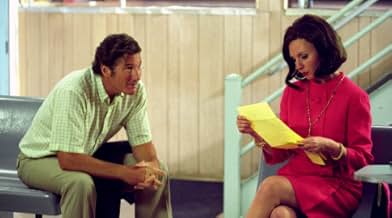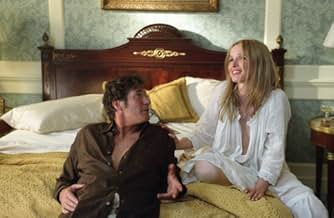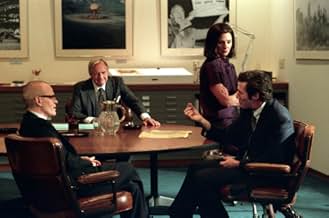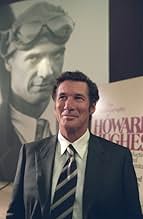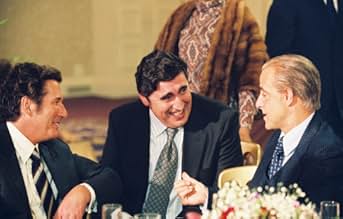Agrega una trama en tu idiomaIn what would cause a fantastic media frenzy, Clifford Irving sells his bogus biography of Howard Hughes to a premiere publishing house in the early 1970s.In what would cause a fantastic media frenzy, Clifford Irving sells his bogus biography of Howard Hughes to a premiere publishing house in the early 1970s.In what would cause a fantastic media frenzy, Clifford Irving sells his bogus biography of Howard Hughes to a premiere publishing house in the early 1970s.
- Dirección
- Guionistas
- Elenco
- Premios
- 1 premio ganado y 3 nominaciones en total
- Bike Messenger
- (as Raul Julia Jr.)
- Man with Red Tie
- (as Stephen Buck)
- Dirección
- Guionistas
- Todo el elenco y el equipo
- Producción, taquilla y más en IMDbPro
Opiniones destacadas
Halstrom surprisingly makes his film light and dark in tone, depending on what stage the story is in, and it's even fun at times to see Irving and Suskind go about their risk-taking maneuvers to get all documents and information they can on Hughes, as if it's guerrilla research. Then as the despair of constant lying increases, and the threat of capture and revelation is nearer, Halstrom makes it more like a paranoid thriller. This latter part may actually be not quite as convincing- so to speak of course, as one can't be sure entirely what's true or not in The Hoax- because, simply, one might not see Irving so much as a crazy person ala Hughes so much as a kind of strange artist-cum-professional at what he does: to make himself believe the BS before he even feeds it to others. Scenes like Irving getting caught by Hughes's "secret agents" in the middle of the night are not as striking as Halstrom might have intended, even as all the while the performances are still good. And the realm of placing the story in context of the times is hit or miss; it works, to be sure, when going into the Nixon administration sections because it's crucial to the story (and, according to some articles on the film, is possibly really accurate), though putting in the footage of Vietnam and protesters and so forth are sort of padding to environment and period. The music, costumes, locations (i.e. Las Vegas) and simple political ramifications make it enough.
This being said, The Hoax provides the audience with some very effective performances. Gere, under the right director, can be terrific, and this is one of his best performances in years, as he balances out Irving's higher aspirations of wealth and notoriety with his latter plunge into confusing his own personality with that of Hughes, with suspicions of everything or anyone around him. The filmmakers wisely don't make Irving very sympathetic, and Gere plays this for all it's worth with moments of charm, tension, and delusions of grandeur played out wonderfully. However, if Gere is good, Alfred Molina is better as Suskind, Irving's collaborator and the real behind-the-scenes guy who helps make Irving's fabrications all the more palatable, like hiding documents out of the Pentagon or flying to another country to mail an envelope. Suskind, unlike Irving, ends up dealing with the hoax with more of a psychological/moral burden, and it ends up weighing on his conscience like a brick. It might make Suskind the more conventional character in the movie, but Molina makes him very real and more of the tragic case than Gere's Irving. Molina's track record, at the least, remains untarnished. Other supporting players like Marcia Hay Harden, Julie Delpy, Eli Wallach, and Stanley Tucci are better than average here.
The Hoax is a good treat in this month's lot of schlock and big-budget trash by sticking close to making it an actor's movie, and sort of a bittersweet take on what a hoax does in such a grand scale as that of Howard Hughes, and what it does to a person the longer and more intense it goes on for.
"The Hoax" may not be Lasse Hallström's best movie, but it's a nice little companion piece to Scorsese's Hughes-biopic "The Aviator".
Richard Gere plays Clifford Irving well enough, but the entire time, I kept thinking of different actors who would've been much more becoming and much more intense. Clifford Irving was a man of dark, magnetic, manipulative vigor and depth. Gere plays him more dryly, as though Irving was virtually cool and carefree rather than coolly masking that intensity.
Alfred Molina, a scene-stealer as always, upstages Gere greatly as his nervous friend and partner in crime who is made to do all the high-risk dirty work, which translates into hilarity on screen.
The Hoax is a wonderful story and a good movie. If it had a different lead and broader scope in the directing, it could've been a wonderful movie, too.
Richard Gere has never been that good of an actor, but he's always had an arrogant charm that makes him oddly likable, and he uses that to its full extent in what is probably his most mature performance here as Clifford Irving, a arrogantly likable and charming liar. He's surrounded by a fantastic supporting cast in Alfred Molina (as his sympathetic and often comical side-kick), Marcia Gay Harden (donning blonde hair and a European accent as his long-suffering but eager to con wife), and Hope Davis (playing his publishing industry connection). Davis probably gets the best line in the film when she says to a coworker who unwittingly foils a "staged" face-to-face meeting with Hughes, "Pray that you drop dead."
The film starts slowly and plays things for "winks and laughs" and light drama. It gets slightly bogged down in the final act as the hoax crumbles under its own preposterous weight and some scenes get heavy on the melodrama. There's also some wishy-washy "conspiracy" theories floating around about the Nixon administration and Howard Hughes that maybe somewhat true, but might be another figment of Irving's fanciful imagination as this is based on his "memoirs" of the events.
These few flaws, however, don't sink the ship as the playful cast and sure-handed direction from Lasse Hallstrom (in what his probably his best work since "Cider House Rules") keep the hoax firmly afloat. What the film ultimately excels in is the connections it makes with Irving's pathological personality (that ultimately leads to severe paranoia and delusions of grandeur), the paranoia of the Nixon administration (that mirrors nicely the modern Bush administration), and the alleged over-the-top eccentricities of the infamous Howard Hughes. In his mind Irving intertwines himself with these two powerful and tragic men. The film highlights how Irving saw himself and Hughes as smooth-talking, larcenous megalomaniacs, and truly believed he was going to be a major player in world history with the take down of Nixon even though he never had direct contact with either man and based his story on gossip, hearsay, and innuendos. It's really not much of a stretch to imagine Hughes bribing Nixon and wielding power like the wizard behind the curtain in Oz, and it makes for a well told tale. Whether we believe the story ultimately lies in how much power we allow each of these men to have. In his image, Irving thought Hughes held power over everyone, and for Irving, his tiny part in all that was the greatest story of all.
¿Sabías que…?
- TriviaThe real-life story that this film depicts unfolded as Orson Welles was making his film F for Fake (1973) in which the real Clifford Irving appears. Because of Irving's new-found notoriety, Welles was obliged to add some additional footage to his film.
- ErroresAbout 12 minutes into the movie before Irving is to meet with McGraw Hill, there is a southerly view of Manhattan with the Empire State Building in the foreground. In the distance looking toward lower Manhattan are the buildings of the World Financial Center. These buildings did not exist in 1971. Also, in 1971 the Twin Towers of the World Trade Center would be visibly under construction albeit not very tall at that time.
- Citas
Clifford Irving: Bumped by this adolescent coffee boy. My lit professor at Cornell compared me to Hemingway! The middle of my life is at hand, and I don't have a couch.
Dick Suskind: Think about this: Henry Miller was 38-years-old, unpublished. His wife left him for a lesbian.
Clifford Irving: You're kind to tell me that, Dick. You're a very good man. You're a good friend. Need a loan?
Dick Suskind: Always.
- Bandas sonorasHere Comes the Sun
Written by George Harrison
Performed by Richie Havens
Courtesy of Stormy Forest Productions Inc. Masters
By arrangement with Bug
Selecciones populares
Detalles
- Fecha de lanzamiento
- País de origen
- Sitio oficial
- Idioma
- También se conoce como
- Vụ Lừa Đảo
- Locaciones de filmación
- Productoras
- Ver más créditos de la compañía en IMDbPro
Taquilla
- Presupuesto
- USD 25,000,000 (estimado)
- Total en EE. UU. y Canadá
- USD 7,164,995
- Fin de semana de estreno en EE. UU. y Canadá
- USD 1,501,000
- 8 abr 2007
- Total a nivel mundial
- USD 11,772,461
- Tiempo de ejecución1 hora 56 minutos
- Color
- Mezcla de sonido
- Relación de aspecto
- 1.85 : 1
Contribuir a esta página




